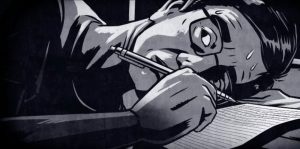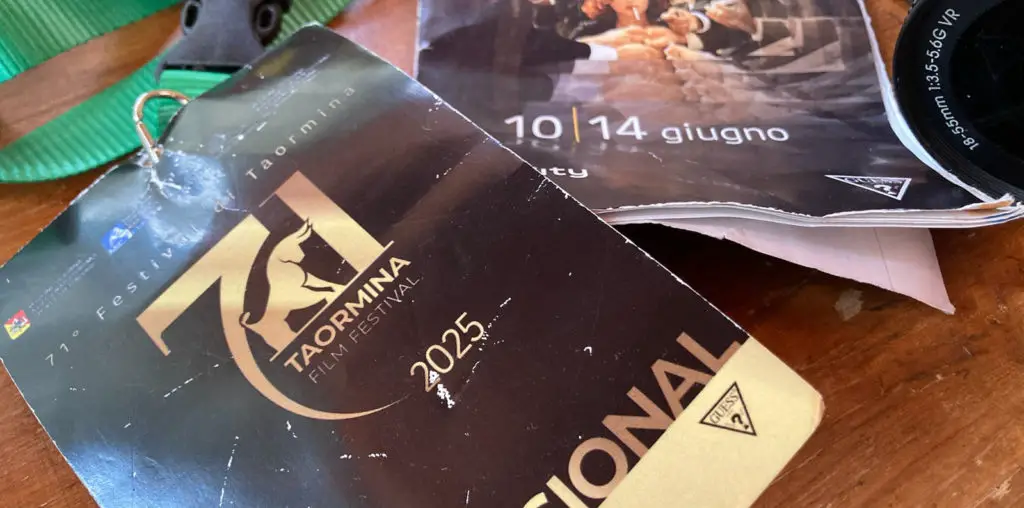
I’m not headed to mainland China anytime soon, but if I was, writing this review of the documentary Letter From Masanjia would make me think twice about my travel plans. This movie is a huge slap in the face to the Chinese Communist Party’s propaganda machine.
Letter From Masanjia begins in Damascus, Oregon, with Julie Keith’s discovery of a letter hidden in her K-Mart Halloween decorations. The letter is written in English and Chinese by a man who claims to be from a labor camp in northeast China, and it details the numerous human rights abuses there. Chinese-born Canadian director Leon Lee tracked down Sun Yi, the writer of the letter, who at the time had been released and was living in Beijing. From there, he reconstructs Sun Yi’s time in the labor camp and observes his life afterward, a “free” man but still living in fear of government oppression.
The reason Sun Yi was in the Masanjia labor camp—which is now closed in response to Western media coverage of his letter—is that he is a practitioner of Falun Gong, a mixture of Buddhist and Taoist teachings that is banned in China. The film makes it clear that his unwillingness to break his faith or stop practicing has had huge consequences for his family life.
The first part of Sun Yi’s story consists of flashback sequences told through animated stills based on Sun Yi’s own drawings of Masanjia. This approach reminded me of Waltz With Bashir, Ari Folman’s rotoscoped documentary about the Israeli-Lebanon war. It’s less technically flashy, but it gets the job done thanks to Sun Yi’s powerful narration. There are scenes of torture and forced labor, during which Sun Yi recounts his efforts to hide letters in the styrofoam tombstones he knew were being sent to America (a source of comic relief, however minor, is Sun Yi’s unawareness of and bafflement at American Halloween customs).

“…a labor camp in northeast China, and it details the numerous human rights abuses there.”
About halfway through the film, we reach the point when American media coverage of Sun Yi’s letter resulted in international protests of China’s labor camps and the shutdown of Masanjia. What seems to be a happy ending 45 minutes into the movie is actually a segue into a less overtly violent, but equally painful section: it covers Sun Yi’s attempts to reunite with his wife (who divorced him out of fear for her family), the bureaucratic and personal roadblocks to their happy life together, and Sun Yi’s constant fear that he is still being monitored by the Communist Party. This section is not as narratively tight as the first, but it is haunting to watch Sun Yi struggle to rebuild his life after all he has lost. The divided structure of the film speaks to a truth of life: happy endings are usually just gateways to more suffering.
One criticism I have of Letter From Masanjia is that the B-roll scenes of Julie Keith’s family appeared a bit stagey. The scenes with Sun Yi and his wife Fu Ning appeared less so, but that might be due to the language barrier. When a minor early scene in a movie like this feels like it’s “for the camera,” it makes you question the authenticity of the rest of what you’re seeing.
Another issue is that I wish the film had delved more into what makes Falun Gong seem so threatening to the Chinese Communist Party. The historical background section, though effective in setting up the film’s more personal story, is only about 5 minutes long. The only information the film provides is that at one point, Falun Gong had more official members than the Communist Party, which prompted laws against the religion and a propaganda campaign accusing it of promoting violence.

“…an intimate portrait of one family’s suffering in the face of government oppression…”
The full context might be absent because director Leon Lee has made another documentary about the persecution of Falun Gong devotees, Human Harvest, and he didn’t want to retread ground from his previous work. Or maybe he wanted to leave the audience with questions so that they will research the situation themselves. The Falun Gong Wikipedia deep dive is there for those who want it.
Whatever the case, Letter From Masanjia might not paint a comprehensive historical picture, but it’s an intimate portrait of one family’s suffering in the face of government oppression. Sun Yi’s stoicism is admirable and moving, but it’s his ex-wife Fu Ning’s tearful recollection of their separation that cements the story in your mind. Her testimony does what so many activist documentaries fail to do: make large-scale suffering real to the viewer.

Letter From Masanjia (2018) Written and directed by Leon Lee. With Sun Yi, Fu Ning, Julie Keith.
8 out of 10 stars

